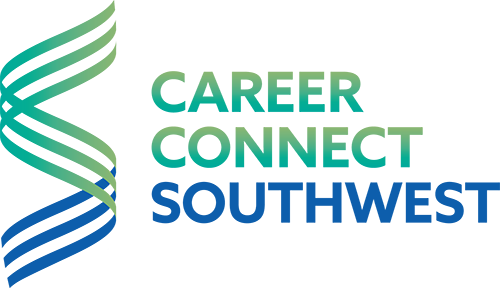Our Framework
Exploration
Career Exploration provides opportunities for students to consider the vast range of employment possibilities available in their community and beyond. Career fairs, work site tours, flipped internships, and career panels are all ways businesses can support student learning by providing volunteers, space and time to support career exploration for local students.
Career Exploration is the second stage of career development within the K-12 Career Connected Learning Framework. This stage should be emphasized particularly during middle and junior high school years, although the process of discovery and investigation never ends.
The goal of Career Exploration is to connect students with industry and business professionals through school activities in order to expose them to a wide array of career opportunities. These activities could include Career Related Learning Experiences (panel discussions, job fairs, speed networking events, guest speakers, etc.) as well as more in-depth, career focused project-based learning (PBL) experiences, such as a flipped internship.
During this stage of career connected learning, students should be encouraged to examine their own particular set of abilities and preferences related to the various career paths they are presented with. Even the discovery that a particular career path is not a good fit is success for the student.
Benefits of Career Exploration
Allows students to explore career options for personal “fit”
Links students to career role models that may be under-represented in their lives
Connects academic content to real-world work experiences
Empowers students to envision themselves in industry roles
Immerses students in industry vocabulary
How to support Career Exploration
Our team focuses on connecting industry partners with educators in an effort to accelerate Career Exploration within our schools. There are multiple ways you can become involved:
Career Related Learning Experiences
Serve as a guest speaker in a school classroom; represent your industry in a “speed networking” or panel discussion event with students; help students with interview skills and resume preparation; or host a tour of your work site for students.
Flipped Internships
Work with educators to develop “Flipped Internships” – a type of learning that challenges students to solve industry related problems. Your role is to aid in the development of the project lesson(s) and engage with a class to introduce the industry specific problem, guide students along in their discovery, and evaluate their suggested solutions over a series of classroom engagements. View Library >
Teacher Worksite Learning
We partner with school districts and businesses to provide teachers with worksite tours, career pathway videos and paid externships to help them develop classroom instructional materials that inform student about in-demand jobs in our region
Project-Based Learning
We are also a provider of extensive training and coaching in Project-Based Learning, which helps teachers to develop learning experiences that authentically connect to a problem outside of the classroom and engages students in practicing the skills needed for success in the real world.
STEM Storylines
For Elementary teachers, our STEM Storylines are a simple way to make career connections explicit in the science instruction. Each storyline introduces a career that is connected to the phenomenon that students are exploring.
